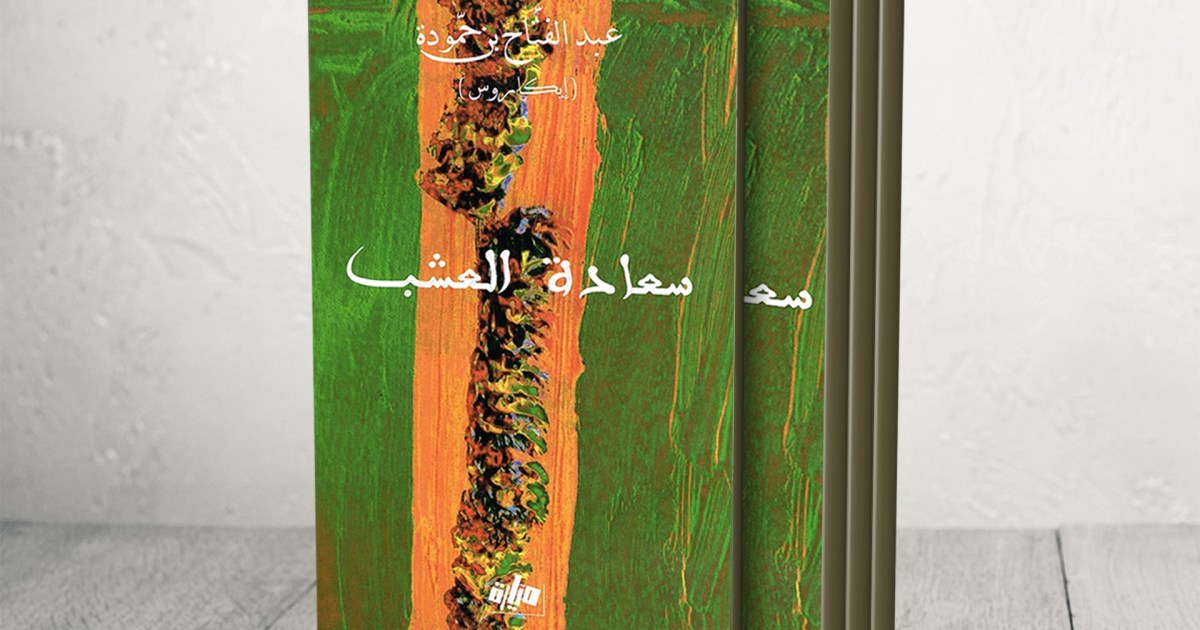One of the exciting and exhilarating things about writing is trying to experiment, because the writer not only tests his vocabulary in writing, but also tests his ability to subject those vocabulary to the experiment that he does.
Were it not for this experimentation, writing in its various literary genres would have remained confined to one school and one style. Rather, it would have created poets who would repeat themselves and their experiences, and one special class of similar readers who had one taste.
Tunisian poet Abdel-Fattah bin Hamouda does not tire of this process of experimentation, although his new poetry collection “The Happiness of the Grass” is his thirteenth poetic work, and his first collection of poetry “Mornings” was published in 1996.
Sea
And because Ben Hamouda – who took for himself a poetic nickname “Icarus” – was born in the Tunisian coastal city of Mahdia (205 km south of the capital, Tunis) in 1971, in addition to his devotion to poetry, the vocabulary of the sea and the dictionary related to the sea are not absent from the atmosphere of his texts He says in his poems:
Sea algae sink
Demonstration of trees in the water
Red eye for summer mountain.
He also says:
A rock against the sea
Wind torn window
Onion for the wife of the seas.
And in another passage:
Carthaginian summer
virgin in the water
Violinist.”
Quote:
Three in the morning
storks tear the sky
word soup.
But the dictionary of the sea is not the dominant one here, otherwise the title of this book is more about grass than the sea, so the reader will find vocabulary and the dictionary of the countryside, such as the forklift, the wheat, the peasant, the peasant, the grass, the village, the gardener, the goat’s milk, the wild rabbit. etc.
With a quick look at the vocabulary of this dictionary – which belongs to this book – we find that it is like a dictionary for a child observing places, people, sounds and smells.
During his long loneliness, he watches every movement and every stillness in a place that is wide and narrow for him, and he does not want to say a lot, but is satisfied with looking, hearing, smelling, and describing a little.
poetic triads
The examples that we have given are repeated in the same written form in every poem. This poetic collection is a single poem composed of 3 sections titled “The Guardian of the Sands”, “The Guardian of the Asphalt”, and “The Guardian of the Grass”, each of which came in 134 sections.
As for the subsequent sections, they are short poems that differ in their form from the first three sections, and we think that it would have been better not to add the subsequent sections, so that the whole book would remain faithful to the method of triads, which took 86 out of 95 pages.
Bin Hamouda wrote these triads in 3 sentences spread over 3 lines, which are condensed and simple nominal sentences at the same time.
And because the poet during writing this condensation has erased a lot, symbolism must prevail in many cases and ambiguity at other times, which gives readers of different layers and their interaction with each passage a margin to decipher this ambiguity and sense of the various layers of meaning.
It is not easy for the reader to read the passages of this book as he reads ordinary poems based on drama, storytelling and simplicity, as is the case with the high percentage of the prose poem that is written today. Rather, he must participate in showing what the poet erased to reach another form and write another passage.
Rusty gun
A razor blade
soldier before the end of the war.
He also says:
A piece of meat in the mouth of a tiger
A whip on a lion’s back
Circus player bravado.
And in another passage:
“Wolves’ fangs for amulets
Sheep frolic over the valley
Shepherds’ graves.
The owner of the “Cast Pot” group said about this experiment and the type of sentence in writing that experimentation is like “a shovel for weeds or a machine that scrapes stones, is a path that the writer must cross in order to learn economy in speech and avoid gossip and delirium.”
The owner of the group “What the ax does not say and the forest sheds” added to Al Jazeera Net, “I always love short sentences, I love nominal sentences and I detest phrasal verbs in Arabic poetry, I do not like conjunctions and conjunctions in poetry, I always like to say a few words.”
haiku
At first glance, the reader thinks that he is faced with passages that come within the famous Japanese “haiku” school of poetry, which is characterized by the style of flash, simplicity and instantaneousness. The soul of another language.
The haiku poem also comes in 3 or 4 lines, and the first lines usually describe something from nature, while the last line is a description of the poet or part of his feelings, meaning mixing perspective with the senses or mixing nature with the human soul.
The Tunisian poet Ben Hamouda wrote an introduction to his collection published by Dar Mayara Al-Tunisiah. He denies this poetic form and tradition from the texts of his book, and considers that his texts may be similar to haiku in the eyes of some, because they contain some of its elements, “but they are not at all.”
The owner of the poetic collection “Down with the Desire of Rain” continued that he tried to write a 3-line prose poem with a performance based on the nominal sentence, “in the end, it is an attempt to find alternatives to the Arabic prose poem based on condensation and brevity.”
He told Al Jazeera Net that many Western and Arab poets “lie in writing that they call arbitrarily (haiku), and the haiku has its family and strict rules, even the American Jack Kerouac wrote delusions that he called the haiku, and this is my opinion since 1999.”
new restrictions
Ben Hamouda took a nickname that is always attached to his name, “Icarus”, a figure from Greek mythology.
The story says that Icarus and his father were imprisoned on the island of Crete by order of the ruler Minos, and to escape from him and his punishment, each of them used two wings and stuck them with wax and flew, and because Icarus was flying close to the sun, the wax melted and fell to the ground and died.
Many passages in this group contain vocabulary denoting chivalry, war, destruction, fighting, and death.
Despite this talk about experimentation, someone might say that restricting the poem to a certain type of sentence, expelling the letters of conjunction and link, and restricting the number of lines returns the prose poem to the restrictions that broke and escaped from, which made it expelled from classical criticism to this day, but in the end it is freedom of writing The main criterion that everyone stands by is whether or not the “poetry of the text” when we talk about poetry.
Despite the ambiguity of many passages, their surrealism at times, and their symbolism, the elite reader will find this collection close to his taste, and he will feel the beauty in what has been crossed out between the lines and words, and he will exalt many of the passages as real poetry, as this passage:
A mud house under the winter rain
Oil lamp lighting a child’s forehead
Hood on his way to school.






